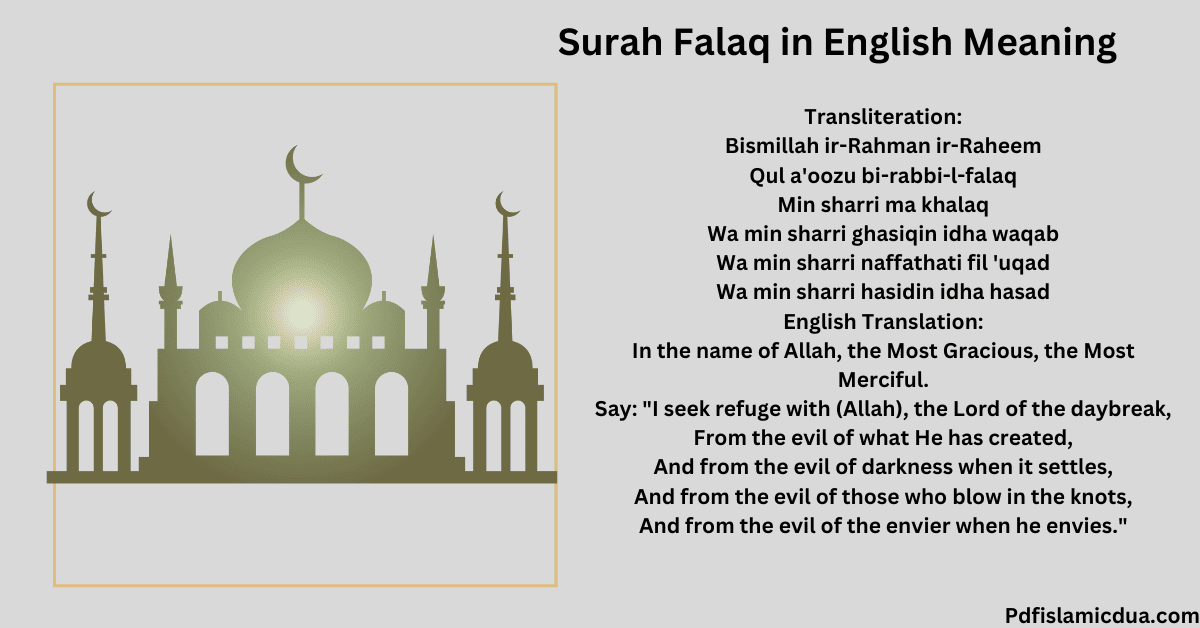Blog
mauzatain surah in quran, quran english translation, quran meaning in malayalam, quran recitation, surah al falaq, surah falak, surah falak with english translation, surah falaq, surah falaq 100 times benefits, surah falaq benefits, surah falaq benefits in urdu, Surah Falaq in English, Surah Falaq in English PDF, surah falaq tilawat, surah naas 100 times benefits, surah nas in english
pdfislamicdua
0 Comments
Surah Falaq in English PDF-Meaning and Benefits
Download Surah Falaq in English PDF
Surah Falaq (The Daybreak) is the 113th chapter of the Quran, consisting of five verses. It is one of the two “Mu’awwidhatayn” (the two surahs of seeking refuge), the other being Surah Al-Nas (114th chapter). These two surahs are often recited together for protection from harm and Evil.
Surah Al-Falaq (The Daybreak) is a powerful prayer of protection, where the believer seeks Allah’s refuge from all forms of Evil, including harm caused by creatures, the darkness, witchcraft (symbolized by blowing in knots), and envy. It highlights Allah as the ultimate protector.

Surah Falaq in English Meaning and Benefits
| Verse (Transliteration) | English Translation |
|---|---|
| Bismillah ir-Rahman ir-Raheem | In the name of Allah, the Most Gracious, the Most Merciful |
| Qul a’oozu bi-rabbi-l-falaq | Say: “I seek refuge with (Allah), the Lord of the daybreak,” |
| Min sharri ma khalaq | From the evil of what He has created, |
| Wa min sharri ghasiqin idha waqab | And from the evil of darkness when it settles, |
| Wa min sharri naffathati fil ’uqad | And from the evil of those who blow in the knots, |
| Wa min sharri hasidin idha hasad | And from the evil of the envier when he envies.” |
Recent Posts
- Surah Al-Nas Meaning, Transliteraion and Benefits
- Surah Hashr last 3 Ayat in English Transliteration and Benefits
- Dua for Protection from Dying in a State of Sin
- Dua for Protection of the Heart (Qalb)
- Dua for Control over Anger (Hilm) in English
Hadith on Surah Al-Falaq
Protection Against Evil:
According to a hadith in Sahih al-Bukhari and Sahih Muslim, the Prophet Muhammad (PBUH) used to recite Surah Al-Falaq and Surah Al-Nas before sleeping. He would blow over his hands after reciting these surahs and then wipe his body, seeking protection from evil.
Abu Sa’eed narrated:
“The Messenger of Allah (S.A.W) would seek refuge from the jinn and the (evil) eye of humans, until Al-Mu’awwidhatain were revealed. So when they were revealed he used them and left other than them.”
(Jami` at-Tirmidhi 2058)
Cure for Illness and Harm:
Narrated `Aisha:
Whenever Allah’s Messenger (ﷺ) went to bed, he used to recite Surat-al-Ikhlas, Surat-al-Falaq, and Surat-an-Nas, then blow on his palms and pass them over his face and those parts of his body that his hands could reach. And when he fell ill, he used to order me to do like that for him.
When to Say Surah Al-Falaq
• Morning and Evening: As part of the morning and evening supplications (Adhkar), it is recommended to recite Surah Al-Falaq three times in the morning after Fajr and in the evening after Maghrib for protection against all harm.
• Before Sleeping: Reciting Surah Al-Falaq along with Surah Al-Ikhlas and Surah An-Naas before sleeping is a Sunnah act for seeking protection during the night.
• During Times of Fear or Anxiety: It can be recited whenever one feels anxious or in need of protection from unseen harm, envy, or evil.
Importance and Benefits of Surah Al-Falaq
• Protection from Evil: Surah Al-Falaq is known as a powerful source of protection. It seeks refuge from various forms of harm, such as evil creatures, darkness, magic (represented by those who blow in knots), and jealousy.
• Spiritual Cleanliness: It is believed that reciting Surah Al-Falaq helps in cleansing the soul from negativity and guarding against spiritual harm from jealousy or black magic.
• Complete Reliance on Allah: By reciting this Surah, believers are reminded to place their complete trust in Allah for protection from every form of evil that exists in the world.
• Curing Jealousy and the Evil Eye: This Surah is specifically highlighted for protection from envy and the evil eye, which are mentioned explicitly in the last verse.
Conclusion
Surah Al-Falaq is important in a Muslim’s life as a source of protection. Reciting this Surah, along with Surah Al-Ikhlas and Surah An-Naas, is a regular part of daily prayers. These Surahs help us seek Allah’s protection from evil, envy, and unseen dangers. They remind us to rely on Allah alone for safety and peace.














Post Comment